|
|
|
Sort Order |
|
|
|
Items / Page
|
|
|
|
|
|
|
| Srl | Item |
| 1 |
ID:
124264
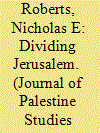

|
|
|
|
|
| Publication |
2013.
|
| Summary/Abstract |
British administrators employed urban planning broadly in British colonies around the world, and British Mandate Palestine was no exception. This article shows how with a unique purpose and based on the promise of a Jewish homeland in Palestine, British urban planning in Jerusalem was executed with a particular colonial logic that left a lasting impact on the city. Both the discourse and physical implementation of the planning was meant to privilege the colonial power's Zionist partner over the indigenous Arab community.
|
|
|
|
|
|
|
|
|
|
|
|
|
|
|
|
| 2 |
ID:
137800
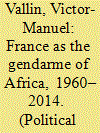

|
|
|
|
|
| Summary/Abstract |
THE EMERGENCE OF FRANCE AS THE GENDARME OF AFRICA goes back to the 1960s and the independence of its African colonies. Unlike other European colonial powers, such as the United Kingdom, France was faced late with decolonization and, most of all, wished to maintain an exclusive influence over its former colonial empire. French West Africa and French Equatorial Africa disappeared, but France sought to maintain privileged and lasting political, cultural, economic, and military relations with the former colonies. The new African regimes would receive military and technical assistance from France in return for backing its international policies. Paris thus established a type of nested neocolonial association with these sub-Saharan states of limited sovereignty. This defined France's pré carré in Africa, its area of exclusive action.
|
|
|
|
|
|
|
|
|
|
|
|
|
|
|
|
| 3 |
ID:
128143


|
|
|
|
|
| Publication |
2014.
|
| Summary/Abstract |
Dynamics of Indian Diaspora in East Africa has been continuous point of attraction for researchers, academicians, policy makers and even general audience. Even a cursory glance reveals that dozens of research has been carried out by scholars and numerous literatures are available on the subject. However, there have been significant changes in the focus of the research. In the colonial period, political activism of Indians in East Africa was a major point contention between colonial power and nationalist leaders which is clearly visible in the writings of CF Andrews (Indian question in East Africa, 1921).
|
|
|
|
|
|
|
|
|
|
|
|
|
|
|
|
| 4 |
ID:
133824
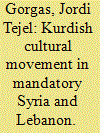

|
|
|
|
|
| Publication |
2014.
|
| Summary/Abstract |
In the late nineteenth and early twentieth centuries diverse, and sometimes competing, movements of cultural renaissance emerged in the Middle East. Within this context, the Kurdish cultural renaissance in the Kurmanji dialect appeared relatively late and moreover its fruits were curtailed by two major events: the First World War and the establishment of the Turkish republic. From 1923 onwards, the task of animating the Kurdish cultural renaissance fell on the Kurds exiled first in mandatory Syria and Lebanon and then in Europe. In exile, Kurdish intellectuals benefited from some advantageous conditions such as freedom of speech and organization. Yet Kurdish intellectual endeavors in the Levant were to face political, social and economic challenges. Using French records and Kurdish newspapers, this article explores both the opportunities and the constraints for the consolidation of the Kurdish cultural renaissance under colonial rule. In doing so, the article intends to enrich the debate on the formation of nationalisms in the interwar era on the one hand, and the relationship between colonial powers and minorities in the Middle East, on the other.
|
|
|
|
|
|
|
|
|
|
|
|
|
|
|
|
| 5 |
ID:
140048
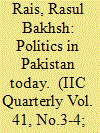

|
|
|
| 6 |
ID:
139666
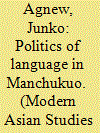

|
|
|
|
|
| Summary/Abstract |
This article explores the language politics of Manchukuo and the implications reflected in the literary texts of the Japanese writer Hinata Nobuo and the Chinese writer Gu Ding. Through the close examination of communicative failures, such as lexical misunderstandings, linguistic barriers, lies, and rumours in Hinata Nobuo's ‘The Eighth Switching Point’ and Gu Ding's ‘The Wilds’, this article illustrates the authors’ different responses to the impact of this language politics. While both authors were aware of the mutable nature of language, Hinata perceived the Japanese language as a symbol of colonial power and thus the miscommunications between Japanese and Chinese in his story address the ethnic hierarchy embedded in language in the specific context of Manchukuo. Gu Ding, on the other hand, did not see language as a defining element of the culture of a nation, and therefore tried to construct a new type of language and community that were not restricted by the discursive notions of the Chinese and Japanese nations. Gu Ding's primary concern was the modernization of his native place and, to him, adherence to traditional language forms was insignificant and deleterious.
|
|
|
|
|
|
|
|
|
|
|
|
|
|
|
|
| 7 |
ID:
131390
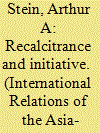

|
|
|
|
|
| Publication |
2014.
|
| Summary/Abstract |
This paper challenges the conventional wisdom that US power and preferences following World War II led to bilateralism in Asia and multilateralism in Western Europe. It argues that the challenges facing the United States in both regions were similar, as were US policies meant to address them. With some lag, the United States supported the economic recovery of the regional powers it had defeated (Germany and Japan), saw the restoration of regional trade as a prerequisite, sought military bases to assure postwar security, and envisioned rearming its former foes as part of its security strategy. The outcomes in the two regions reflected the preferences and reservations of regional actors. The critical differences between the regions were structural. The existence of middle powers was critical in Europe, the return of colonial powers to Asia precluded regional arrangements in the short term, and geostrategic differences shaped the requisites for regional security.
|
|
|
|
|
|
|
|
|
|
|
|
|
|
|
|
| 8 |
ID:
134011
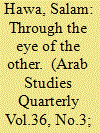

|
|
|
|
|
| Publication |
2014.
|
| Summary/Abstract |
This article seeks to apply Derrida's deconstruction of elements constituting national identity as established under colonial power to the study of Bassam Tibi, Fouad Ajami, and Bernard Lewis' work on Arab identity. This approach allows the emergence of colonial and neo-colonial elements underlying these authors' understanding of what Edward Said identified as the "Arab condition." Analyses show that both Arab authors' definition of Arab identity has been heavily influenced by colonial powers in a threefold manner: early colonization of the Arab lands by the Ottomans until 1920, European colonial rule during the nineteenth and twentieth centuries, and finally, the impact of living in the West. The article also highlights how the colonial power, exemplified in the work of Bernard Lewis, chooses to view the colonized "other" and often changes this view in accordance with political expediency.
|
|
|
|
|
|
|
|
|
|
|
|
|
|
|
|
|
|
|
|
|